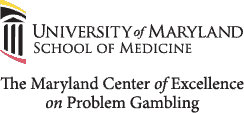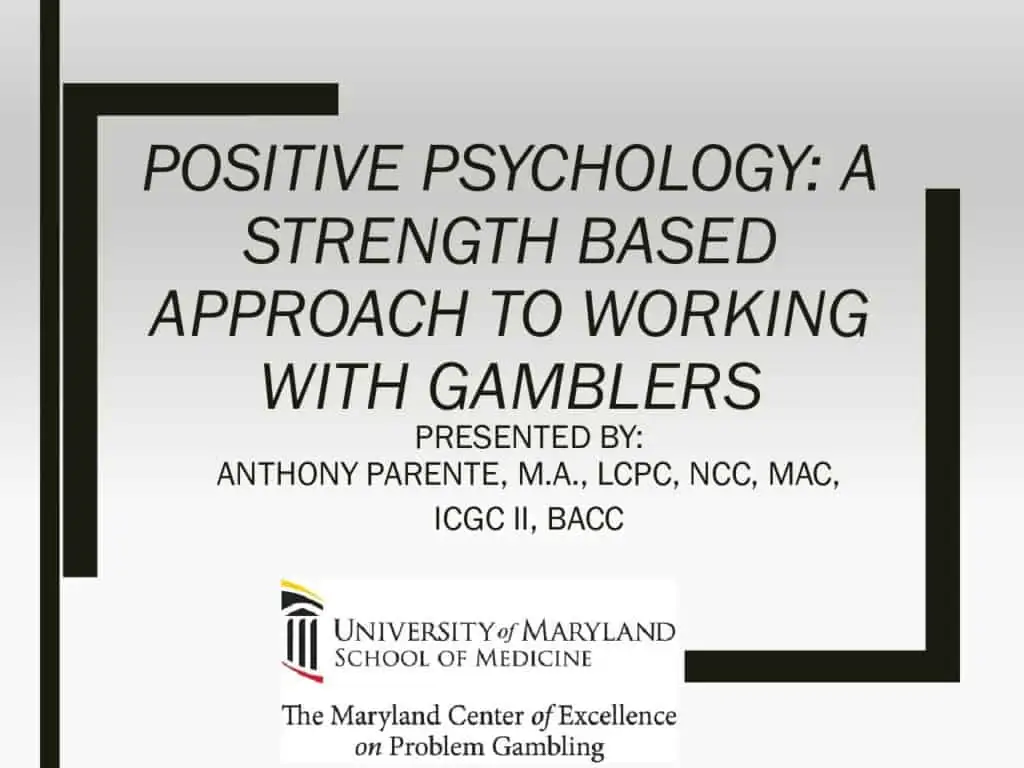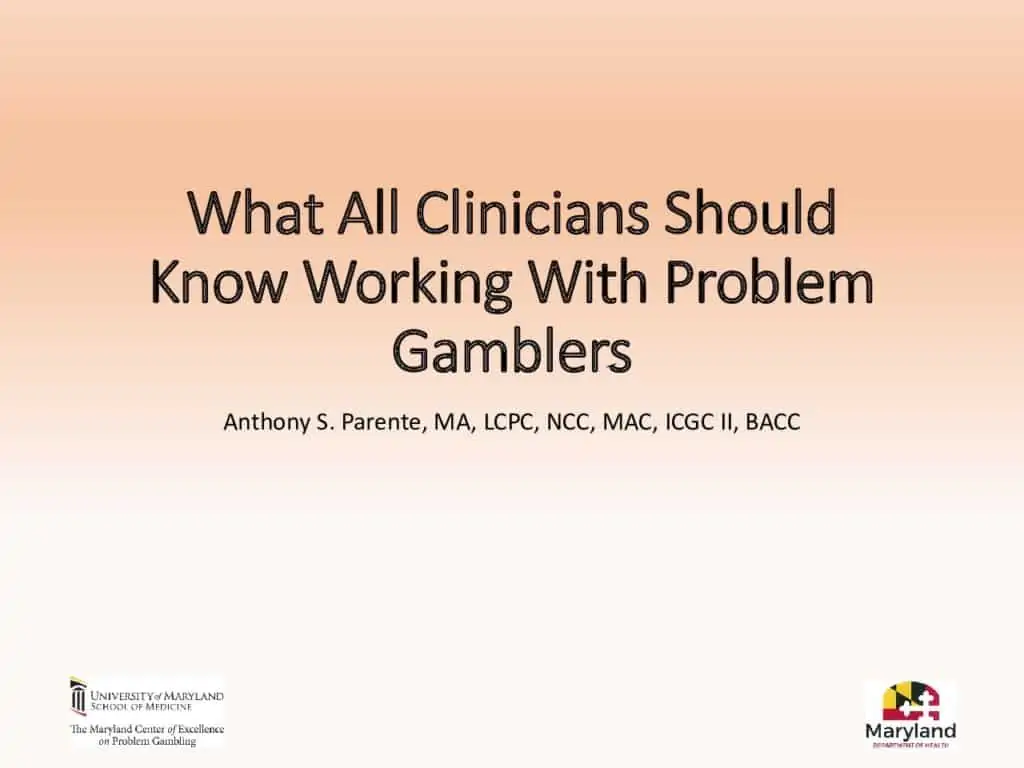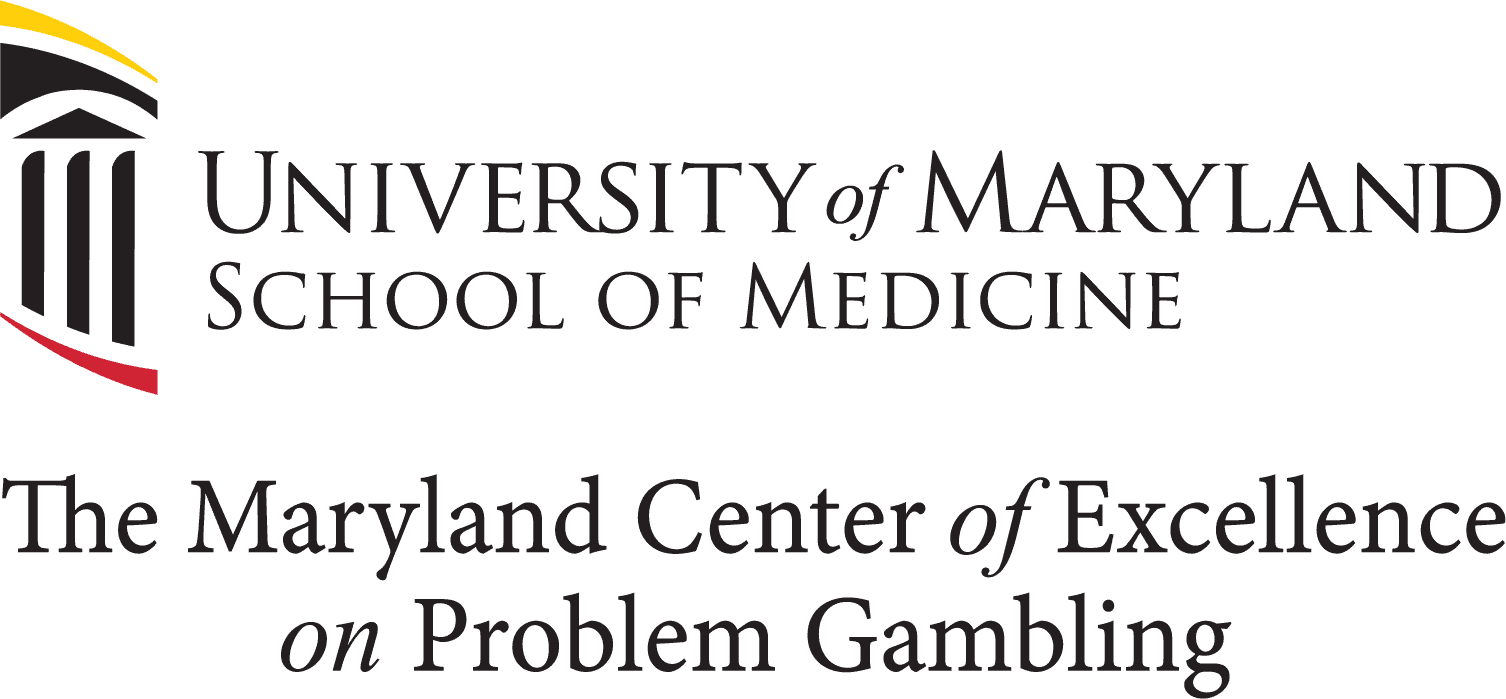We invite you to join us for the 2019-2020 series of free webinars designed to provide additional problem gambling clinical training on a variety of topics. One (1) CEU will be offered for each webinar. All webinars are one (1) hour, 12:00-1:00 PM EST.
Friday, October 25, 2019
“Motivational Interviewing with the Gambler”
Presented by: Anthony Parente, M.A., LCPC, NCC, MAC, ICGC II, BACC
Summary:
Motivational Interviewing is an effective evidenced based approach used in the treatment of addictions. It is a Person-Centered style of counseling that uses techniques which engage clients to move toward changing behaviors and their lives. Join us for this informative workshop on how to impact the change process with clients who have problems with gambling with co-occurring addictions. Understand the Spirit and the stages of MI and the strategies relevant for each stage. Explore when and how to use Motivational Interviewing as one of the intervention tools that is applicable to a variety of settings. This workshop will provide the clinician an opportunity to reflect on their practice.
Leaning Objectives: Attendees should be able to:
- Learn what Motivational Interviewing is and how it works to effect change
- Learn how to apply the skills of MI
- Gain an enriched understanding of the change process and our resistance to change.
- Learn and how to move clients through the stages of change.
CLICK HERE to View PowerPoint.
Friday, November 15, 2019
“Problem Gambling and the Military”
Presented by: Mary Drexler, MSW, Program Director
Summary:
Unhealthy gambling is a problem for many in our nation’s military. Nearly 10% of US veterans struggle with disordered gambling, a rate two-three times higher than the general population. Military experiences and post-deployment stress can be attributed to this higher risk of problem gambling and gambling addiction in this population, as well as the abundance of opportunities for veterans and enlisted personnel to gamble. This webinar will review how we as professionals can adapt our strategies for prevention, treatment and recovery of gambling disorder with military and veterans to best meet their needs and help them take back control of their lives.
Leaning Objectives: Attendees should be able to:
- Identify scope of problem gambling in active duty military and veteran populations
- Identify problem gambling risk factors for those serving in the military
- Adapt prevention, treatment and recovery strategies to best align with military and veteran groups
CLICK HERE to View PowerPoint.
Friday, December 13, 2019
“Self-Compassion and Resilience for Healers Working with Trauma and Problem Gamblers”
Presented by: Anthony Parente, M.A., LCPC, NCC, MAC, ICGC II, BACC
Summary:
Compassion Fatigue is an occupational hazard for those who are in the practice of helping others to make lifestyle transformations. The workshop will address and explore responses to trauma from the perspective of clients and mental health professionals. Participants will learn techniques for working with trauma survivors and gamblers. It is also essential for healers to be resilient in order to maintain peak performance while providing services to those in need. This workshop is a training to help caregivers maintain and build resilience by using mindfulness-based practices that result in the enhancement of self-care.
Leaning Objectives: Attendees should be able to:
- Explore and discuss the impact of caring and compassion fatigue
- Understand the role of trauma in the treatment of gambling disorders.
- Address the toll that helping and being a healer has on our physical and emotional well-being.
- Understand the challenge for healers to remain resilient in response to the demands of our work.
CLICK HERE to View PowerPoint.
Friday, January 31, 2020
Title: Underage and Problem Gambling Prevention Basics and Overview of Prevention Strategies in Maryland
Presented by: Heather Eshleman, MPH, Prevention Manager
Summary: Learn how public health models, including the Strategic Prevention Framework (SPF), can be used to prevent underage and problem gambling in the State of Maryland. From special population grants, to youth grants, and environmental prevention strategies, learn of the Programs the Center’s Prevention Office is implementing to reduce underage and problem gambling, targeting individuals and communities. A summary of what clinicians can do to promote underage and problem gambling prevention strategies will be included.
Leaning Objectives: Attendees should be able to:
- Understand public health models from the Institute of Medicine and the Center for Substance Abuse Prevention that can be used to prevent underage and problem gambling.
- Be familiar with underage and problem gambling prevention strategies currently implemented by the Center.
- Find out how clinicians and other community members can assist with underage and problem gambling prevention strategies in Maryland.
CLICK HERE to View PowerPoint.
Friday, February 21, 2020
Title: Have the Conversation: March Problem Gambling Awareness Month
Presented by: Heather Eshleman, MPH, Prevention Manager
Summary: Problem Gambling Awareness Month, held each March, is a grassroots public awareness and outreach campaign created and sponsored by the National Council on Problem Gambling to educate the general public and behavioral health providers and preventionists on problem gambling. “Have the Conversation” is an opportunity for an open dialogue and candid discussion to bring awareness to gambling behaviors and resources available within the community and promote action within one’s organization for integrating gambling awareness and problem gambling prevention and treatment into existing services.
Leaning Objectives: Attendees should be able to:
- Understand the risks and identify warning signs that may be associated with problem gambling.
- Learn talking points that can be incorporated into conversations around the topic of gambling – with colleagues, friends, family and clients.
- Learn tips for talking with special populations, e.g. youth, older adults, persons in recovery, etc.
- Create a problem gambling awareness activity plan to implement within your organization and/or community.
CLICK HERE to View PowerPoint.
Friday, March 27, 2020
Title: Lost in Space: What you need to know…but have Not Asked about Gambling, Gaming and Cyberspace Addictions. Presented by: Anthony Parente, M.A., LCPC, NCC, MAC, ICGC II, BACC
Summary: Behavioral addictions come in many forms. There are features that are common to all types of addictive behaviors and others that are distinct to specific addictions. Gambling has become increasingly easy to access on electronic devices as convenience and technological advances shape our everyday lives. Join us for this interesting and informative presentation on the ways in which gambling, gaming and cyberspace addictions affect the lives of those who experience problems in this area, as well as their family members. Learn how habits form and their impact on the brain. The discussion will also include what professionals and family members can do to help someone with these dependencies.
Leaning Objectives: Attendees should be able to:\
- Increased understanding of what defines Gambling, Gaming and Cyber addictions. What it does mean and what it does not mean.
- Learn how habits form and their impact on the brain and behavior.
- Improve participants understanding of the signs and symptoms of gambling, gaming and cyber dependency.
- Learn what we can do for family and friends who we suspect may have dependency on gambling, gaming or cyber dependency.
CLICK HERE to View PowerPoint.
Friday, April 24, 2020
Title: “A Stress Management/Mindfulness Approach to Working with the Problem Gambler”
Presented by: Anthony Parente, M.A., LCPC, NCC, MAC, ICGC II, BACC
Summary: Stress and its impact affect us all. Stress is related to all major health problems in the United States including gambling disorder and other addictions. This workshop will increase participants understanding of stress and teach effective stress management tools and techniques to help gambling disordered clients. In this webinar helping professionals will learn how stress depletes our resources on a physical, cognitive, emotional and spiritual level. Participants will learn how to rejuvenate and restore our energy in all of these areas. Research has demonstrated that using Mindfulness based practices in recovery increases clients’ success. Learn effective strategies for reducing stress, improving treatment outcomes, and enhancing the lives of those we serve.
Leaning Objectives: Attendees should be able to:
- Increase their understanding of stress and the impact that it has on our lives and our clients
- Participants will learn about the relationship between stress and gambling problems.
- Help clients develop effective strategies to cope with stress and enhance their potential for success in recovery
CLICK HERE to View PowerPoint.
Thursday, May 21, 2020
Title: “The Following Play is Under Review: An Analysis of Sports Betting Legislation through a Responsible Gambling Lens” Presented by: Blair Innis, JD
Summary: Gambling regulation has, for the most part, been left up to state and local governments. Correspondingly, the U.S. federal government does not provide states with funds to address problem gambling and disallows states from utilizing the federal funds invested in substance use disorder treatment ($14.7 billion in 2016) to fund problem gambling treatment. The result is poor funding for problem gambling services and a patchwork of responsible gambling-related policies and programs across the United States. This is currently being played out with sports betting which states are now free to legalize after a Supreme Court decision from May, 2018. Since that ruling, 18 states have legalized sports betting with a wide variety of problem gambling protections. Some states limit the locations where sports betting can take place, some states restrict online sports betting, some have increased funding to problem gambling programs, and some have not addressed the issue at all. This presentation will analyze the various legal and policy approaches that states have taken in responsible sports gambling regulation, and discuss possible model policies for states to consider as they continue to legalize sports betting.
Learning Objective: Attendees should be able to:
- View the current landscape of legalized sports betting across the United States.
- Learn the various legal and policy approaches that states have taken, or are taking, in responsible sports gambling regulation.
- Discuss legal and policy levers that are effective in mitigating problem gambling, with emphasis on newly legalized sports betting.
CLICK HERE to View PowerPoint.
Friday, May 29, 2020
Title: “Positive Psychology: A Strength Based Approach to Working with Gamblers”
Presented by: Anthony Parente, M.A., LCPC, NCC, MAC, ICGC II, BACC
Summary: Positive Psychology is a strength based approach to working with others which enhances their ability to thrive. This workshop will teach the clinician how to use Positive Psychology in their work with gamblers and their families. Learn ways to help clients use their positive attributes in order to create the conditions for a successful recovery and increased life satisfaction. This workshop will teach helping professionals how to assist clients to experience ways to improve their ability to experience positive emotions, gratitude, and live a meaningful life. Positive Psychology helps clients to cultivate the best within themselves. Join us for this uplifting exploration of the good that lies within each of us.
Leaning Objectives: Attendees should be able to:
- Learn what Positive Psychology is and how it can be applied
- Learn how a strength based approach to gambling treatment helps to improve treatment outcomes
- Develop a greater understanding of how to employ the principals of Positive Psychology into healthy lifestyle choices for the gambler and their families
- Learn how to create the therapeutic conditions to allow our clients to thrive
Friday, June 12, 2020
Time: 11:00 AM-12:30 PM EST (90 minutes)
Title: “Video Games: A Gateway to Gambling?”
Presented by: Cam Adair
Description: Video games have changed, and so too have their business models. Today, video games are designed to not only keep you playing, but increasingly to keep you spending money. Features like in-app purchases, micro-transactions, loot boxes, skins, and esports betting cause concern over their risks of gambling behavior. What does research show? What are the latest trends? Are video games a gateway to gambling? Come find out!
Learning Objectives. Participants will be able to:
- Identify three gaming monetization schemes and features
- Describe three trends that present a risk for problem gambling
- Distinguish how gaming and gambling are similar and how they differ
- Identify three dark patterns that manipulate player behavior
- Explain four suggestions for potential video game regulations
NOTE: CEUs are not provided for Video viewing.
Thursday, June 18, 2020
Time: 2:00 PM-3:00 PM EST
Title: “Working with State and Local Departments of Aging on Problem Gambling Prevention”
Presented by: Heather Eshleman, M.P.H., Prevention Manager, Maryland Center of Excellence on Problem Gambling
Description: According to the Maryland State Department of Aging, of the 5.8 million people in Maryland in 2015, 18.35% were age 60 or over. By 2030, this percentage is likely to increase to 25.4% of the Maryland population projected to be 6.7 million. With an increase in access to gambling in Maryland over the last 10 years, it is anticipated there will be a greater need to focus on the growing senior population with safe gambling education and resources for problem gambling. The Maryland Center of Excellence on Problem Gambling has been working with the Secretary of Aging and her staff to implement problem gambling prevention strategies from the State administration level that will impact all jurisdictions in the State with training and problem gambling prevention strategies. During the same time period, peer recovery support specialists are contacting senior centers in their local areas, offering presentations on safe gambling and problem gambling resources. This webinar will provide an overview of how to work with your State Department of Aging; how to provide presentations at local senior centers using Peer Recovery Support and other support staff; ideas for prevention strategies; and lessons learned.
Learning Objectives: Participants will be able to:
- Learn how to involve your State Department of Aging in problem gambling prevention and possible strategies for implementation.
- Learn how to schedule and conduct presentations on safe gambling and problem gambling resources using peer recovery support specialists at local senior centers.
- Understand successes and challenges faced in planning and implementing problem gambling prevention strategies for senior populations.
Friday, June 26, 2020
Title: “What All Clinicians Should Know Working with Problem Gamblers”
Presented by: Anthony Parente, M.A., LCPC, NCC, MAC, ICGC II, BACC
Summary: Join us for this interesting an informative webinar which will cover what every clinician should know when working with problem gamblers. As gambling continues to become increasingly accessible there has been and will continue to be a rise in the prevalence of problematic gambling. This webinar is applicable and relevant for all helping professionals working in the areas of mental health and addictions.
Learning Objective: Attendees should be able to:
- Understand the basics of the DSM diagnostic criteria for Gambling Disorder and it’s severity
- Learn effective use of screening /assessment tools and engagement strategies when working with gamblers
- Be knowledgeable of Co-occurring disorders and gambling
- Understand the Pathways Model of Gambling Disorder
- Review future trends in gambling
- Understand Compassionate Recovery






